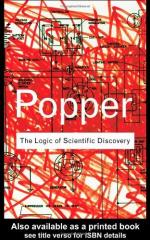
|
| Name: _________________________ | Period: ___________________ |
This test consists of 15 multiple choice questions and 5 short answer questions.
Multiple Choice Questions
1. What does Popper give credit to conventionalism for doing?
(a) Blind acceptance of logic.
(b) Adapting to varying conditions.
(c) Offering differing opinions.
(d) Linking theory to experiment.
2. What is the concept of simplicity a part of according to Popper?
(a) Framework of induction.
(b) Infinite regress.
(c) Metaphysical logic.
(d) Logical reasoning.
3. How must scientific statements be tested?
(a) By their deductive consequences.
(b) By their inductive consequences.
(c) Logically.
(d) Systematically.
4. What does Popper suggest is not psychological?
(a) Subjectivism.
(b) Objectivism.
(c) Existentialism.
(d) Observability.
5. From what does methodological rule differ?
(a) Rules of sustainability.
(b) Rules of logic.
(c) Rules of science.
(d) Rules of truth.
6. What comprises empirical science?
(a) Guides to explanations.
(b) Natural laws.
(c) Universal assumptions.
(d) Systems of theories.
7. According to conventionalism, what is required to make determinations of the natural world?
(a) Proofs.
(b) Inferences.
(c) Laws.
(d) Theories.
8. What type of reasoning does Popper deny exists?
(a) Deductive.
(b) Inductive.
(c) Testable.
(d) Scientific.
9. Also referred to as singular statements, what are subsets of events?
(a) Post events.
(b) Occurrences.
(c) Situations.
(d) Sub-events.
10. What refers to a term that does not need a definition but is learned through experience?
(a) Primitive term.
(b) Epistemological term.
(c) Existential term.
(d) Advanced term.
11. What is the reason Popper rejects psychologism?
(a) Perceptions allow for justifications.
(b) Perceptions are inter-objective.
(c) Perceptions are inter-subjective.
(d) Perceptions do not allow for justifications.
12. What is diametrically opposed to the critical attitude required of a scientist?
(a) Epistemology.
(b) Dogmatic defense.
(c) Experimentation.
(d) Demarcation.
13. What should guide the methods of testing scientific statements?
(a) Psychology.
(b) Physics.
(c) Logic.
(d) Epistemology.
14. What does Popper say methodological rules are?
(a) Conventions.
(b) Keys to understanding.
(c) Testable.
(d) Irrelevant.
15. What is one characteristic of the relationship between theory and classes of statements that must be present?
(a) Abstract.
(b) Tautological,
(c) Consistent.
(d) Auxiliary.
Short Answer Questions
1. What type of rule do positivists and reductionists adhere to, according to Popper?
2. What type of reasoning does Popper believe inductive reasoning is?
3. Natural laws are in a form to negate what type of statements?
4. According to Popper, what can't universals be reduced to?
5. What denotes what is universal about an occurrence?
|
This section contains 343 words (approx. 2 pages at 300 words per page) |

|




